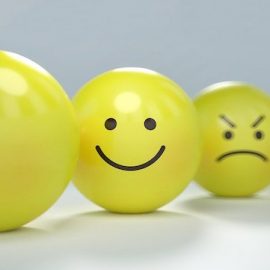

This article is an excerpt from the Shortform book guide to "Stumbling on Happiness" by Daniel Gilbert. Shortform has the world's best summaries and analyses of books you should be reading.
Like this article? Sign up for a free trial here .
Is taking advice from others a good idea? Do you shrug off advice given to you by friends and family?
Studies have shown that making decisions based on your own memories often leads to poor decision-making and unhappiness. However, social psychologist Daniel Gilbert says that taking advice from others can help you overcome your bias and faulty memories. Unfortunately, many ignore the advice of others for two main reasons.
Here’s why people tend to ignore advice from others.
Using the Insights of Others
If we can’t use our own experiences to make better choices, can we use the experiences of those who’ve made similar choices in the past? Unfortunately, writes Gilbert, we could, but we don’t. We avoid taking advice from others for two reasons: We believe the incorrect information we receive from others, and we ignore the correct information we receive from others.
(Shortform note: There are likely additional reasons beyond the two Gilbert outlines for why we don’t act on the insights of others. In Thinking, Fast and Slow, Daniel Kahneman writes that our pride can prevent us from accepting hard evidence that we were wrong about something in the past. Our pride can conceivably also cause us to ignore evidence from others that we may be wrong about the future: If we think we’ll ace a test, we may ignore the warning of someone who already took the test and found it difficult because believing them would mean accepting our initial assessment was wrong.)
Let’s look at each reason in more detail:
Reason #1: You Believe Incorrect Information From Others About What Makes You Happy
Gilbert writes that we often believe inaccurate information about what makes us happy because of the nature of that particular information: Some incorrect information about happiness is able to perpetuate itself because it encourages people to take the actions that spread it. Let’s illustrate this using the incorrect information that having kids makes you happy:
Your parents pass this information on to you at a young age, and you later act on it by having kids. You then tell your kids that having their own kids will make them happy, since you believe it’s true—it’s what everyone always told you, after all. Eventually, your kids have kids, too, who they tell to have kids, and the cycle continues. In this way, the information “having kids makes you happy” self-perpetuates, because it encourages people to keep producing the next generation who’ll learn and spread the information.
Yet, argues Gilbert, this information is incorrect: People with kids aren’t happy. They report low levels of happiness from childbirth until their kids go to college. The reason we perpetuate this lie is because of Correction Error #3: We remember feeling the way we believe we should have felt while parenting—happy and rewarded—not the way we actually felt: unhappy and tired.
This type of self-perpetuating information is essential to the continuation of humanity as a whole, not to the happiness of the individual, contends Gilbert. For us to survive as a species, we need to believe this information about what will make us happy, even though it’s untrue. We see this clearly in the example of “having kids makes you happy”—if we didn’t believe having kids makes us happy, none of us would have kids, and our species would die out.
You therefore can’t make better choices about the future using the insights of others because virtually all humans buy into and spread the same poor, self-perpetuating information about happiness, concludes Gilbert. That poor information may help our species to succeed, but it also forms the basis of decisions that leave you personally unhappy.
(Shortform note: Gilbert claims that there are certain ideas about what will make us happy that all humans “fall for” simply because we need to fall for them to keep humanity afloat. This could make us feel like unthinking cogs in a survival machine. Yet while this notion can be disheartening, some have proposed that while our genes undeniably want human life to continue, individual humans can still construct meaning beyond procreation for their own lives. We can make the world a better place through altruistic action, for instance, and in that way, we can defy the notion that we’re just tools used for some higher purpose.)
| Parental Happiness Around the World Gilbert claims that the belief that having kids makes you happy is a lie, pointing to studies that show American parents are unhappy from the time their child is born until that child departs for college. However, parental happiness levels differ around the world, and not all parents are as unhappy as the American ones Gilbert describes. Of 22 surveyed countries, the US had the highest gap between parental and non-parental happiness: 12%. Some countries also reported lower levels of parental happiness than nonparental happiness, but many countries have parents who are happier than nonparents. Among them are Russia, France, and, topping the charts with eight-percentage-points-greater parental happiness, Portugal. Part of the reason why American parents report low happiness may be due to the lack of workplace support and paid time off for working parents. Being a parent in the US is also more expensive than elsewhere, particularly when you factor in college tuition, which is higher than in other countries. |
Reason #2: You Ignore Correct Information From Others About What Makes You Happy
According to Gilbert, you also fail to correct your future decision-making because you don’t listen to correct information from others about what will make you happy. It’s technically possible to make better choices by finding out how others feel after making those choices. However, you don’t heed their insights as you don’t believe others’ feelings can apply to you, Gilbert asserts. This is because all humans believe their experience of life is more unique than it is. In reality, though, our lived experience and feelings about those experiences can quite easily mirror other people’s.
For instance, you’re considering taking a management position at your company. The previous incumbent warns you not to do so, as they were miserable in the job—the boss was too demanding and the team was difficult to manage.
It’s likely that you’d face the same issues if you took the job since the boss and team members in question are still working for the company and are still just as difficult to work with. However, you ignore the incumbent’s advice because you believe you’re uniquely placed to handle these challenges: You worked with a difficult manager in the past, so you figure you’re resilient enough to cope with a similar situation again. You take the job, but you end up miserable—even with your uniquely resilient temperament, the boss and team members are so persistently combative that you find them difficult to handle. You should have heeded the previous manager’s words.
(Shortform note: Gilbert argues that we limit our ability to improve our decision-making by thinking that the opinions and experiences of others can’t apply to us because we’re too unique. However, that’s not the only misconception that keeps us from listening to others: We also believe that we’re above average in every way and therefore better than everyone around us. This is called the better-than-average effect and can similarly lead to poor choices about the future. For instance, if you think you’re a better swimmer than your friend, you might head into waters they claim are dangerous because you think you can manage better than they can—even though this poses a threat to your safety.)

———End of Preview———
Like what you just read? Read the rest of the world's best book summary and analysis of Daniel Gilbert's "Stumbling on Happiness" at Shortform .
Here's what you'll find in our full Stumbling on Happiness summary :
- A look at how your brain fabricates your reality leading you to make bad decisions
- The six specific types of bad choices people make
- How to improve your decision-making in the future






